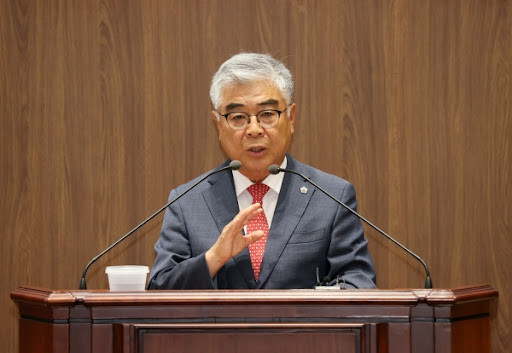
Calls for special measures, including improved incentives for teachers in concentrated schools and operation of alternative school models.
Yoo Seong-jae, a member of the Chungnam Provincial Assembly (Cheonan 5, People Power Party), strongly asserted the urgent need for a comprehensive overhaul of the education system in Chungnam, pointing out that despite the continuous increase in the number of multicultural students in the region, they are still exposed to discrimination and prejudice, and the stability of education is hindered by frequent teacher transfers. This call adds weight to the demand for proactive and preemptive responses from educational authorities amidst the rapid transition to a multicultural society.
At the 2nd plenary session of the 359th Chungnam Provincial Assembly's regular meeting held on the 11th, Assembly Member Yoo stated, "With the increase in international marriages and the influx of foreign workers, the number of multicultural students has more than tripled compared to 10 years ago." He further clearly raised the problem that "discrimination and prejudice against multicultural students still deeply rooted in schools, and the public education system unilaterally focuses on assimilation into Korean culture, failing to adequately respect the unique identities and cultural backgrounds of multicultural students." Analysis suggests that the difficulties faced by multicultural students, such as language barriers, cultural differences, and feelings of alienation within peer groups, are complex and highly likely to lead to academic underachievement.
Indeed, the number of multicultural students in Chungnam has steadily increased from 11,569 in 2022 to 13,430 in 2024, accounting for 5.8% of the total student population. This proportion is the second highest nationwide, following Jeollanam-do, demonstrating that Chungnam is a region where multicultural education is of great importance. Particularly, there are 8 schools where the proportion of multicultural students exceeds 30%, and these schools are concentrated in the Asan area, exacerbating the problem of educational imbalance in specific regions.
Assembly Member Yoo emphasized the unique characteristics of these schools with a high concentration of multicultural students, citing the shocking reality that "in schools where the proportion of multicultural students exceeds 82.6%, more than 50% of teachers wish to transfer after one year, and the average teaching experience of teachers is only 1 year and 6 months." He stressed, "As it is difficult to expect stability in school education with frequent teacher transfers, the Ministry of Education and the Office of Education must prepare active support measures considering these special circumstances." This is interpreted as an essential measure to provide a stable educational environment for multicultural students and to deepen the professionalism of teachers.
To this end, Assembly Member Yoo argued that "it is urgent to improve the incentive system for teachers working in schools with a high concentration of multicultural students." He called for concrete measures, stating, "Special improvement measures, such as designating research schools and granting promotion加点 (additional points), must be prepared to boost the morale and strengthen the professionalism of teachers dedicated to multicultural education." The logic is that if teachers are not burdened by multicultural student education but rather gain opportunities to be recognized for their expertise and develop their careers, they will be motivated to voluntarily dedicate themselves to this field.
Furthermore, Assembly Member Yoo proposed that "considering the difficulties multicultural students face in adapting to the public education system, a legal framework should be established to allow for the operation of 'alternative schools' as an extension of public education." This is interpreted as emphasizing the need for a flexible education system that can provide not only Korean language education but also programs tailored to multicultural students' identity formation, vocational education linkages, and cultural characteristics. Finally, Assembly Member Yoo urged the Chungcheongnam-do Office of Education to "actively pursue policies to become the central axis of multicultural education, leading a multi-ethnic and multicultural society, rather than just providing simple support," calling for the creation of an environment where multicultural students, who will be the leaders of future society, can fully realize their potential.
[Copyright (c) Global Economic Times. All Rights Reserved.]






























